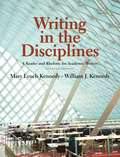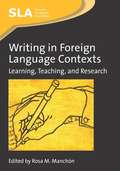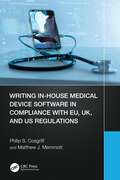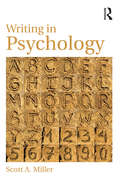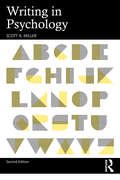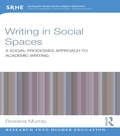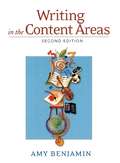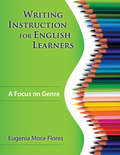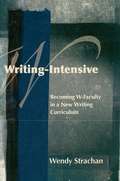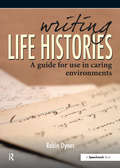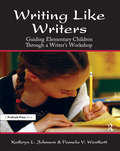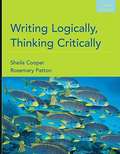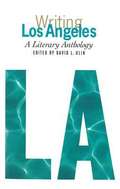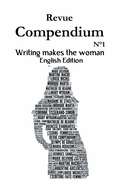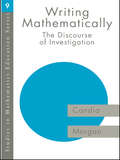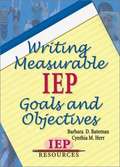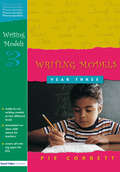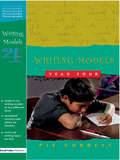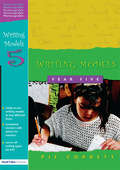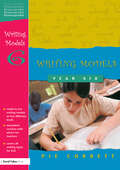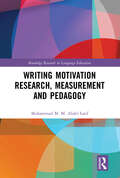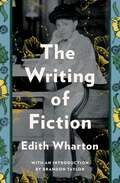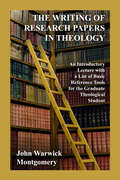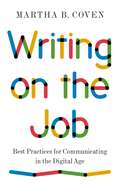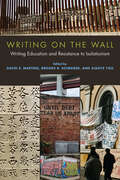- Table View
- List View
Writing In The Disciplines: A Reader And Rhetoric For Academic Writers
by Mary Lynch Kennedy William J. KennedyThis rhetoric/anthology instructs college students in how to read academic texts with understanding and how to use them as sources for papers in a variety of disciplines. <P><P>In Writing in the Disciplines, Mary Kennedy and William Kennedy emphasize academic writing as ongoing conversations in multiple genres, and do so in the context of WPA Outcomes. <P><P>The rhetoric chapters teach critical reading, paraphrasing, summarizing, quoting, writing process, synthesizing, analyzing, researching, and developing arguments. <P><P>The anthology balances journal articles with works by public intellectuals in the sciences, social sciences, and humanities.
Writing in Foreign Language Contexts
by Rosa ManchonThis book represents the most comprehensive account to date of foreign language (FL) writing. Its basic aim is to reflect critically on where the field is now and where it needs need to go next in the exploration of FL writing at the levels of theory, research, and pedagogy, hence the two parts of the book: 'Looking back' and 'Looking ahead'. The chapters in Part I offer accounts of both the inquiry process followed and the main insights gained in various long-term research programs. The chapters in Part 2 contribute a retrospective analysis of the available empirical research and of professional experiences in an attempt to move forward. The book invites the reader to step back and rethink seemingly well established knowledge about L2 writing in light of what is known about writing in FL contexts.
Writing In-House Medical Device Software in Compliance with EU, UK, and US Regulations
by Philip S. Cosgriff Matthew J. MemmottThis book is a comprehensive guide to producing medical software for routine clinical use. It is a practical guidebook for medical professionals developing software to ensure compliance with medical device regulations for software products intended to be sold commercially, shared with healthcare colleagues in other hospitals, or simply used in-house.It compares requirements and latest regulations in different global territories, including the most recent EU regulations as well as UK and US regulations.This book is a valuable resource for practising clinical scientists producing medical software in-house, in addition to other medical staff writing small apps for clinical use, clinical scientist trainees, and software engineers considering a move into healthcare. The academic level is post-graduate, as readers will require a basic knowledge of software engineering principles and practice.Key Features: Up to date with the latest regulations in the UK, the EU, and the US Useful for those producing medical software for routine clinical use Contains best practice
Writing in Psychology
by Scott A. MillerThis book helps readers become better writers of psychology and better writers in general. After reading thousands of course papers, theses, and dissertations, Dr. Miller knows and addresses the issues that students find most challenging when writing about psychology. Written with the utmost flexibility in mind, the chapters can be read in any order. More comprehensive than similar texts, this book provides detailed coverage of how to write empirical reports, research proposals, and literature reviews, and how to read meta-analyses. Readers will also find invaluable strategies for improving one’s writing including how to adopt an engaging yet accurate style, thorough coverage of grammatical and word use rules that govern writing in general, and the APA (American Psychological Association) rules that govern the expression of that content. Readers will appreciate these helpful learning tools: Describes the most common APA style rules encountered and/or highlights references to the Manual when more detailed knowledge is required. Numerous examples from journal articles that help readers gain a clearer understanding of content they will encounter in writing psychological reports. Chapter exercises that provide an opportunity to apply the points conveyed in each chapter. Examples of the most common mistakes made by students and how to avoid them and best practices for improving one’s writing. Tables that help readers gain a clearer understanding of the new standards in the APA Publications Manual, 6th ed (Appendix A). Errors in APA Style exemplified via an improperly formatted paper and another version noting corrections pertaining to APA style and grammar, to highlight the most common pitfalls encountered by students (Appendix B). Ideal for courses on writing in psychology or as a supplement for graduate or advanced undergraduate courses in research design or research methods, this book also serves as a resource for anyone looking for guidance on how to write about psychological content.
Writing in Psychology
by Scott A. MillerThe second edition of Writing in Psychology by Scott A. Miller is a comprehensive guide to addressing the most challenging issues that students face while writing about psychology, including what to say and how to say it. It offers practical tools to overcome the challenges and create an engaging work. The book is a valuable resource for helping readers become better writers of psychology with the aid of various helpful learning tools, which provide detailed coverage of how to write empirical reviews, research proposals, literature reviews, term papers, and posters. It examines examples from journal articles that give readers a grasp of the content they will encounter in writing psychological reports. Furthermore, it includes exercises that provide an opportunity to apply the points conveyed in each chapter, examples of ways to avoid the most common mistakes made by students, and a guide to the best practices for improving one’s writing. Readers will also develop a thorough understanding of how to write in an engaging yet accurate style, using grammatical and word use rules that govern writing in general, and the rules of seventh edition APA (American Psychological Association) Publication Manual that determine the expression of that content. Throughout, the book emphasizes inclusion, diversity, and fair treatment of those with whom psychologists deal, in research and writing. The book will benefit anyone looking for guidance on how to write about psychological content. It is ideal for research scholars and psychology students as a primary text for writing in psychology courses and a supplement for graduate or advanced undergraduate courses in research design or research methods.
Writing in Social Spaces: A social processes approach to academic writing (Research into Higher Education)
by Rowena MurrayWriting in Social Spaces addresses the problem of making time and space for writing in academic life and work of the professionals and practitioners who do academic writing'. Even those who want to write, who know how to write well and who have quality publications, report that they cannot find enough time for writing. Many supervisors are unsure about how to help postgraduates improve their writing for thesis and publication. Whilst the problem does presents through concerns with ‘time’, it is also partly about writing practices, academic identities and lack of motivation. This book provides a research-based, theorised approach to the skill of writing whilst retaining a link to writing practices and giving immediate yet sustainable solutions to the writing problem. It supplies new theory and practice on: socializing writing-in-progress and writing with others exploring the alternation of conscious and unconscious, internal and external processes in academic writing whilst in a social grouping Applying social processes in the writing process Using case studies and vignettes of writing in social spaces to illustrate the theory in practice, This book is a valuable resource for academics, scholars, professionals and practitioners, as well as researchers at all stages of their career, and in all disciplines.
Writing in the Content Areas
by Amy BenjaminDo you spend entirely too much time correcting your students' papers? Do your students' essays and term papers take side trips to nowhere? Is their writing riddled with mechanical errors? Do their lab reports and essays lack specificity and clarity? Writing in the Content Areas, Second Edition is for middle and high school content area teachers who assign essays, term papers, lab reports, and other writing tasks to students. This book provides strategies and tips to help teachers of social studies, science, art, etc. improve the quality of students' writing and apply national and state curriculum standards in your classroom. The strategies in this book can be integrated easily into every teacher's daily plans. They will help your students improve their abilities to - reflect before writing - organize and classify - provide detail without padding - use technical terminology correctly - avoid unnecessary words - spell correctly- take useful notes while they read and during your lectures.This book will help teachers - get what they want from a writing task - frame their assignments more precisely - correct student papers more quickly and efficientlyThe new second edition offers activities and strategies which involve technology (word processing, presentation programming, the Internet, and e-communications), differentiated instruction, and brain-based learning.
Writing Instruction for English Learners: A Focus on Genre
by Eugenia R. Mora-FloresFocusing on narrative, expository, and persuasive writing and poetry, this guide provides strategies and tools to facilitate writing development for English learners in Grades 2–8.
Writing-Intensive: Becoming W-Faculty in a New Writing Curriculum
by Wendy StrachanIn one of the few book-length studies of a major post-secondary writing-across-the-curriculum initiative from concept to implementation, Writing-Intensive traces the process of preparation for new writing requirements across the undergraduate curriculum at Simon Fraser University, a mid-sized Canadian research university. As faculty members across campus were selected to pilot writing-intensive courses, and as administrators and committees adjusted the process toward full implementation, planners grounded their pedagogy in genre theory—a new approach for many non-composition faculty. So doing, the initiative aimed to establish a coherent yet rhetorically flexible framework through which students might improve their writing in all disciplines. Wendy Strachan documents this campus cultural transformation, exploring successes and impasses with equal interest. The study identifies factors to be considered to avoid isolating the teaching of writing in writing-intensive courses; to engender a university-wide culture that naturalizes writing as a vital part of learning across all disciplines; and to keep the teaching of writing organic and reflected upon in a scholarly manner across campus. A valuable case history for scholars in writing studies, WAC/WID, and curricular change studies.
Writing Life Histories: A Guide for Use in Caring Environments
by Robin Dynes"Writing Life Histories" is a practical handbook which gives clear guidance on how to put together life histories in supportive or residential settings. It provides: step-by-step guidance; ideas for different types of life histories; activities, strategies and material for prompting memories; helpful tools and writing tips; suggestions for support and forming partnerships with other local services; ideas for involving the person's family and friends; and, discussion on ethical issues to be considered. The benefits of engaging a group or an individual in life history activities include - an aid to memory; creative stimulation; a personalised identity when in a residential home; promotion of interaction and co-operation with others; and, continuity with previous life experience thus combating loss of identity as well as an excellent opportunity to pass on knowledge and experience to others. For staff knowing about past experiences will promote an understanding of behaviour, needs and outlook on life resulting in more personalised care. Staff have references for conversation with cognitive impaired individuals and knowledge about life accomplishments which promotes respect for individuals. This is an indispensible resource for anyone interested in compiling life histories including nurses, residential home staff, carers, tutors and occupational therapists, group facilitators in day centres, clubs for the elderly or learning disabilities.
Writing Like Writers: Guiding Elementary Children Through a Writer's Workshop
by Pamela V. Westkott Kathryn L. JohnsonBuild a classroom of excited, talented young writers. This wonderful teaching resource offers a complete approach to creating a classroom of enthusiastic, skillful student writers.The authors provide a comprehensive approach to teaching writing in the classroom. This book offers the strategies teachers need to teach writing skills that meet national standards and to produce excellent results from children.Topics addressed in this guidebook include:creating the writing classroom,teaching the writing process,teaching effective writing strategies,teaching elements of story structure,teaching the advanced craft of writing, andusing a writer's workshop to teach good writing. Writing is a great differentiator. During the writer's workshop, each student is engaged in meaningful ways. Pulling together more than three decades of practical experience and research on the best strategies for teaching writing, Writing Like Writers offers a friendly, easy-to-use guide for any teacher seeking to build a classroom of successful writers.Grades 2-6
Writing Logically, Thinking Critically (6th Edition)
by Sheila Cooper Rosemary PattonThis concise, accessible text teaches students how to write logical, cohesive arguments and how to evaluate the arguments of others. Integrating writing skills with critical thinking skills, this practical book teaches students to draw logical inferences, identify premises and conclusions and use language precisely. Students also learn how to identify fallacies and to distinguish between inductive and deductive reasoning. Ideal for any composition class that emphasizes argument, this text includes coverage of writing style and rhetoric, logic, literature, research and documentation.
Writing Los Angeles: A Literary Anthology (A Library Of America Special Publication)
by David L. UlinIn this book, The Library of America presents a glittering panorama of the city, encompassing fiction, poetry, essays, journalism, and diaries by over seventy writers. This revelatory anthology brings to life the entrancing surfaces and unsettling contradictions of the City of Angels, from Raymond Chandler’s evocation of the murderous moods fed by the Santa Ana winds to John Gregory Dunne’s affectionate tribute to “the deceptive perspectives of the pale subtropical light.” Here are fascinating strata of Los Angeles’s cultural and social history, from the oil boom of the 1920s to the graffiti artists of the 1980s, from flamboyant evangelist Aimee Semple MacPherson to surf music genius Brian Wilson, from the German émigré intellectuals chronicled by Salka Viertel to the hard-bitten homicide cops tracked by James Ellroy. Here are its fragile ecosystems, its architectural splendors, and its social chasms, in the words of writers as various as M.F.K. Fisher, William Faulkner, Bertolt Brecht, Evelyn Waugh, Octavio Paz, Joan Didion, Walter Mosley, and Mona Simpson. Art Pepper discovers Central Avenue in the heyday of the 1940s jazz scene; Charles Mingus describes an early encounter with the builder of the Watts Towers; screenwriter Robert Towne reflects on the origins of Chinatown; John McPhee powerfully conveys the devastation of Los Angeles mudslides; David Hockney teaches himself how to drive in record time; and Pico Iyer finds at Los Angeles International Airport “as clear an image as exists today of the world we are about to enter.” This book is an incomparable literary tour guide to a city of shifting identities and endless surprises.
Writing makes the woman: Excerpts from selected texts and contributions (1 of 1 #1)
by Stanislas KazalCompendium means an abstract or summary, in the form of a compilation, of a corpus of knowledge in a given field. If some women have been great writers and have been pushed to genius by the eloquence of the heart, the delicacy of the mind, the wisdom of judgment, the art of grouping the entire world around them, the literary history has often been reserved to only a small portion. We, Corinne Tisserand -Simon and I had after this observation, the desire to give read extracts that testify to the fact that literature is not built solely from the male point of view. It is time to say that women's writing is not an epiphenomenon in literary history to pave the way for a reading that would take into account the obstacles, the compromises, the weight of forms and norms with which women fought, flayed, censored to pass as they could then, under a speech sometimes too agreed, too suitable, under masks, denial or forbidden, a woman's writing.
Writing Mathematically: The Discourse of 'Investigation' (Studies In Mathematics Education Ser.)
by Candia MorganSchool mathematics curricula internationally tend to emphasise problem-solving and have led to the development of opportunities for children to do maths in a more open, creative way. This has led to increased interest in 'performance-based' assessment, which involves children in substantial production of written language to serve as 'evidence' of their mathematical activity and achievement. However, this raises two important questions. Firstly, does this writing accurately present children's mathematical activity and ability? Secondly, do maths teachers have sufficient linguistic awareness to support their students in developing skills and knowledge necessary for writing effectively in their subject area? The author of this book takes a critical perspective on these questions and, through an investigation of teachers' readings and evaluations of coursework texts, identifies the crucial issues affecting the accurate assessment of school mathematics.
Writing Measurable IEP Goals and Objectives
by Barbara D. Bateman Cynthia M. HerrA guide to quick and effective writing of accurate and measurable IEP goals and objectives. IEPs are necessary, required by law and when done properly can be extremely helpful in guiding the student's educational trajectory. This book, written by two of the foremost special educators and IEP legal experts is designed to bring you up to speed whether you're just entering the field or have worked in it for years.
Writing Models Year 3 (Writing Models Ser.)
by Pie CorbettTeachers who want to cut lesson planning time should welcome this series, revised in line with the new literacy framework in the second edition. Writing Models aims to help teachers cover every sort of writing type they need; fine tune lessons by following key teaching points for each model; and deliver the new literacy units to pupils of varying a
Writing Models Year 4 (Writing Models Ser.)
by Pie CorbettTeachers who want to cut lesson planning time should welcome this series. The new editions are revised in line with the new literacy framework and bring you new models. Writing Models aims to help teachers cover every sort of writing type they need; fine tune lessons by following key teaching points for each model; and deliver the new literacy unit
Writing Models Year 5 (Writing Models Ser.)
by Pie CorbettTeachers who want to cut planning time and save energy should welcome this series. It will help teachers to: cover every sort of writing type they need to at Key Stage with a model provided for each one; fine tune lessons by following key teaching points for each model; deliver the literacy hour to pupils of every ability using different versions of the same model.
Writing Models Year 6 (Writing Models Ser.)
by Pie CorbettThe new edition for Year 6 has been fully updated and restructured in line to deliver new units from the new framework and includes new writing models. Lesson planning has never been easier! The revised Writing Models Year 6 contains:A range of fiction genres such as traditional tale, fantasy, chatty style (new), horror (new) and character story an
Writing Motivation Research, Measurement and Pedagogy (Routledge Research in Language Education)
by Muhammad M. Abdel LatifThis book provides a unique reference and comprehensive overview of the issues pertinent to conceptualizing, measuring, researching and nurturing writing motivation. Abdel Latif covers these theoretical, practical and research issues by drawing on the literature related to the eight main constructs of writing motivation: writing apprehension, attitude, anxiety, self-efficacy, self-concept, learning goals, perceived value of writing and motivational regulation. Specifically, the book covers the historical research developments of the field, the measures of the main writing motivation constructs, the correlates and sources of writing motivation, and profiles of motivated and demotivated writers. The book also describes the types of the instructional research of writing motivation, provides pedagogical guidelines and procedures for motivating students to write, and presents suggestions for advancing writing motivation research, measurement and pedagogy. Detailed, up-to-date, and with a glossary which includes definitions of the main terms used in the six chapters, this book will be of great interest to academics, researchers and post-graduate students in the fields of language education, applied linguistics, psycholinguistics and educational psychology.
The Writing of Fiction: The Classic Guide To The Art Of The Short Story And The Novel (The\collected Works Of Edith Wharton)
by Edith WhartonA rare work of nonfiction from Edith Wharton, The Writing of Fiction contains brilliant advice on writing from the first woman ever to win a Pulitzer Prize -- for her first novel The Age of Innocence. In The Writing of Fiction, Wharton provides general comments on the roots of modern fiction, the various approaches to writing a piece of fiction, and the development of form and style. She also devotes entire chapters to the telling of a short story, the construction of a novel, and the importance of character and situation in the novel. Not only a valuable treatise on the art of writing, The Writing of Fiction also allows readers to experience the inimitable but seldom heard voice of one of America's most important and beloved writers, and includes a final chapter on the pros and cons of Marcel Proust.
The Writing Of Research Papers In Theology: An Introductory Lecture with a List of Basic Reference Tools for the Graduate Student
by John Warwick MontgomeryA "how to" on theological research covering little known American and European resourses. Even though this was orignally written in 1957, this is a master class from before the age of the internet and still valuable today.
Writing on the Job: Best Practices for Communicating in the Digital Age
by Martha B. CovenA practical and compact guide to writing for professionalsWriting is an essential skill in today’s workplace. From messaging platforms and social media to traditional forms of communication like memos and reports, we rely on words more than ever. Given how much reading we do on mobile devices, being able to write succinctly is critical to success. Writing on the Job is an incisive guide to clear and effective writing for professionals.Martha Coven begins with the basics, explaining how to develop a professional style, get started on a piece of writing, create a first draft, and edit it into a strong final product. She then offers practical advice on more than a dozen forms of writing, from emails and slide decks to proposals and cover letters. Along the way, Coven provides a wealth of concrete examples and simple templates that make the concepts easy to understand and apply.Based on Coven’s popular writing classes and workshops at Princeton University as well as her decades of experience in the public and private sectors, Writing on the Job addresses the real challenges professionals face in today’s digital age, and shares essential practices that can improve the performance of any organization.
Writing on the Wall: Writing Education and Resistance to Isolationism
by Xiaoye You David S. Martins Brooke R. SchreiberThe first concerted effort of writing studies scholars to interrogate isolationism in the United States, Writing on the Wall reveals how writing teachers—often working directly with students who are immigrants, undocumented, first-generation, international, and students of color—embody ideas that counter isolationism. The collection extends existing scholarship and research about the ways racist and colonial rhetorics impact writing education; the impact of translingual, transnational, and cosmopolitan ideologies on student learning and student writing; and the role international educational partnerships play in pushing back against isolationist ideologies. Established and early-career scholars who work in a broad range of institutional contexts highlight the historical connections among monolingualism, racism, and white nationalism and introduce community- and classroom-based practices that writing teachers use to resist isolationist beliefs and tendencies. “Writing on the wall” serves as a metaphor for the creative, direct action writing education can provide and invokes border spaces as sites of identity expression, belonging, and resistance. The book connects transnational writing education with the fight for racial justice in the US and around the world and will be of significance to secondary and postsecondary writing teachers and graduate students in English, linguistics, composition, and literacy studies. Contributors: Olga Aksakalova, Sara P. Alvarez, Brody Bluemel, Tuli Chatterji, Keith Gilyard, Joleen Hanson, Florianne Jimenez Perzan, Rebecca Lorimer Leonard, Layli Maria Miron, Tony D. Scott, Kate Vieira, Amy J. Wan
